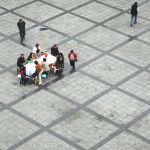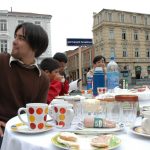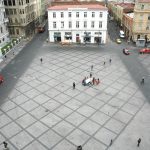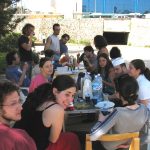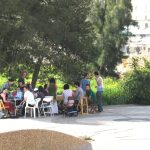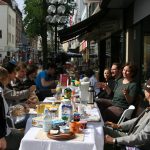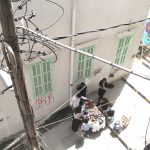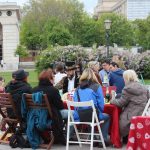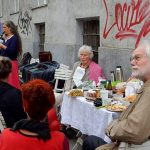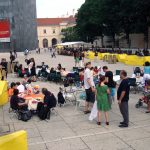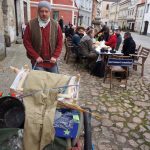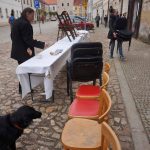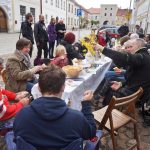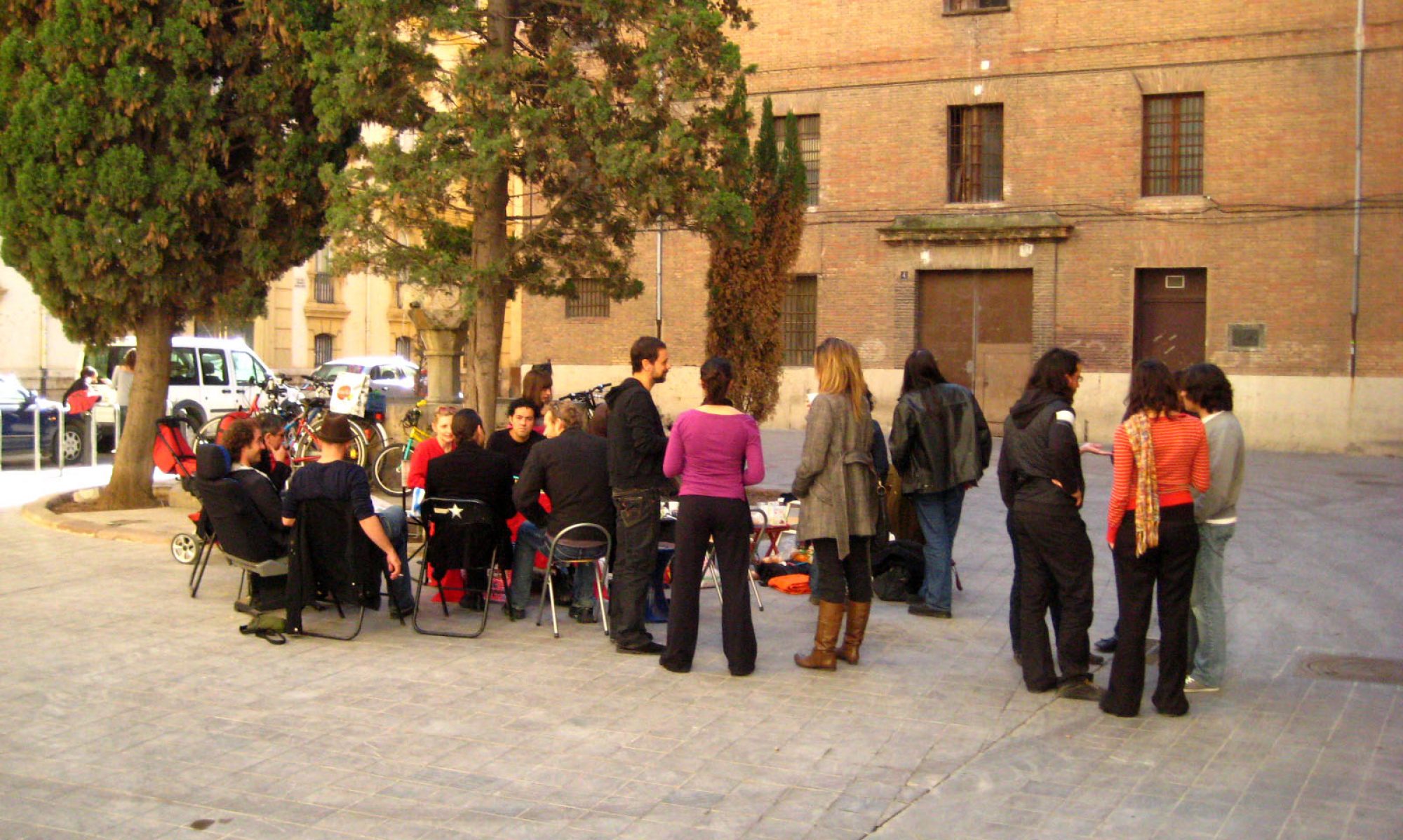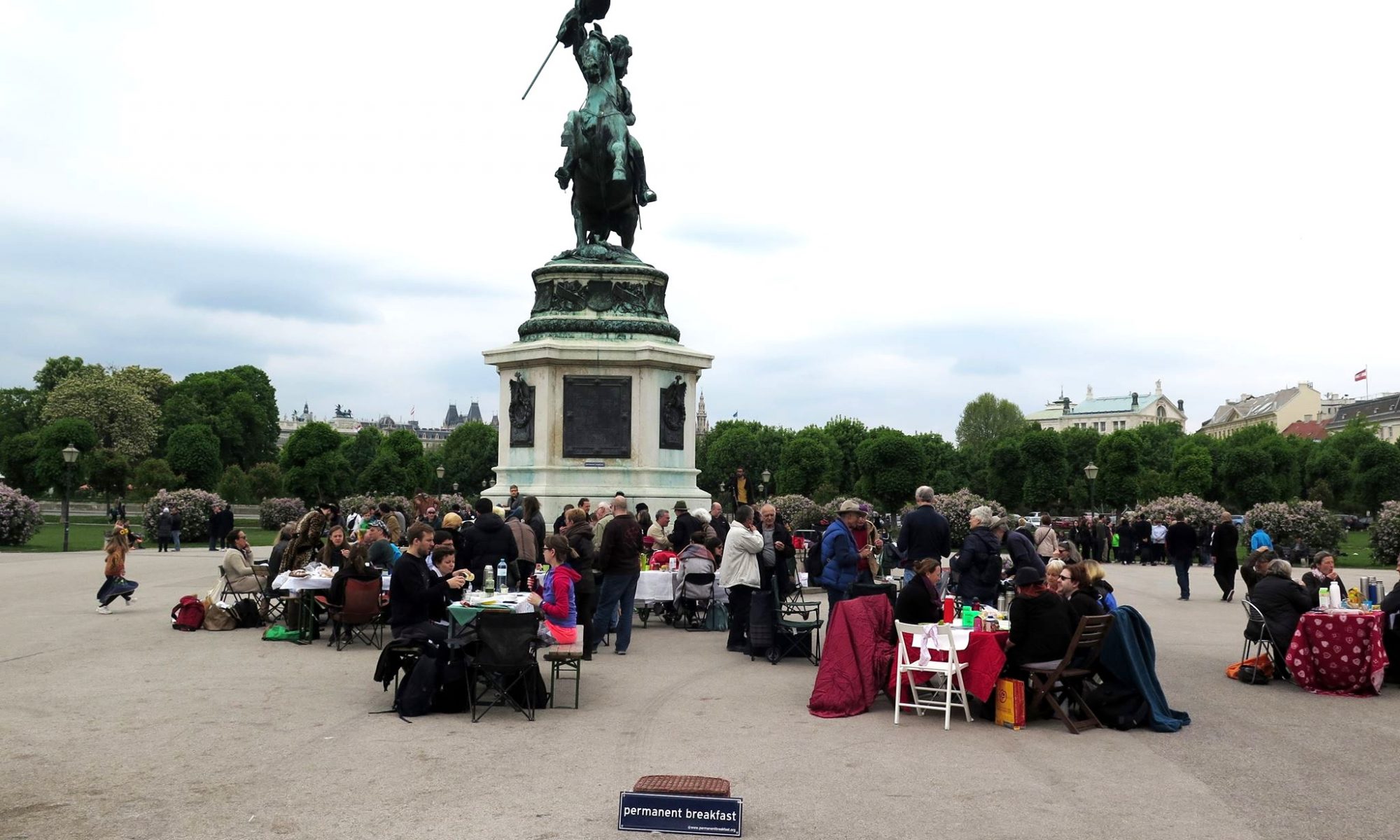You are cordially invited to join our “permanent breakfast” on May 1st! We will meet on Heldenplatz in Vienna at 10:00. Please bring chairs, tables and food. Why? What better way can a public space be utilized than to share a meal together. Either join us in Vienna or organize your own permanent breakfast in your neighbourhood. Read more for instructions.
Update: Photos!
You find some photos of the event here: https://www.permanentbreakfast.org/2018/05/01/photos-of-permanent-breakfast-burner-edition-may-1st-2018/
Join us in Vienna
In Vienna (Austria), we will meet at Heldenplatz, around the Prinz-Eugen Statue.
Setup your breakfast at 10:00 on May 1st 2018.
Start eating 10:30.
Here is the facebook event.
Tease your appetite by watching this video of a previous “permanent breakfast”
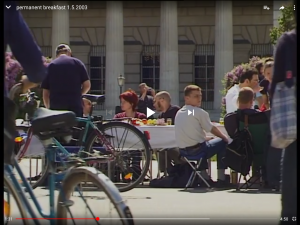
https://www.youtube.com/watch?v=Ect9uBcJ9-o
How to participate at a permanent breakfast (burner edition)?
It is a breakfast in a public space. One person invites. People join. Everyone contributes. Please bring your own food, coffee, tables, chairs. Please behave responsibly and clean up behind yourself.
Make it a happening. For starters, a nice breakfast is eaten from a table, sitting on chairs. Get creative: add tablecloth, flowers, decoration and music! Beautify your breakfast! Share what you bring with others to multiply it.
Document and publish it. Capture your experience in text, video, photograph. Publish it on your blog or social media channel so that we can connect. Use hashtag #permanentbreakfast. Share your story within your regional Burning Man group. We organizers need media to document our experiences and inspire more people to follow. Please publish your photos under a license comparable to “Creative Commons By Attribution Non-Commercial” to let us use them. Thanks!
Organize your own. The invited people commit to organize another permanent breakfast themselves. Copy our concept. Remix. Remember that organizers are legally reponsible to adher to local law on meetings in public places, and note that there is much more allowed and possible than commonly believed. If every participant organizes a new breakfast, soon there will be a public breakfast every day somewhere in the world. That’s why it’s called “permanent breakfast”.
This is an adaptation of the standard permanent breakfast rules from permanentbreakfast.org
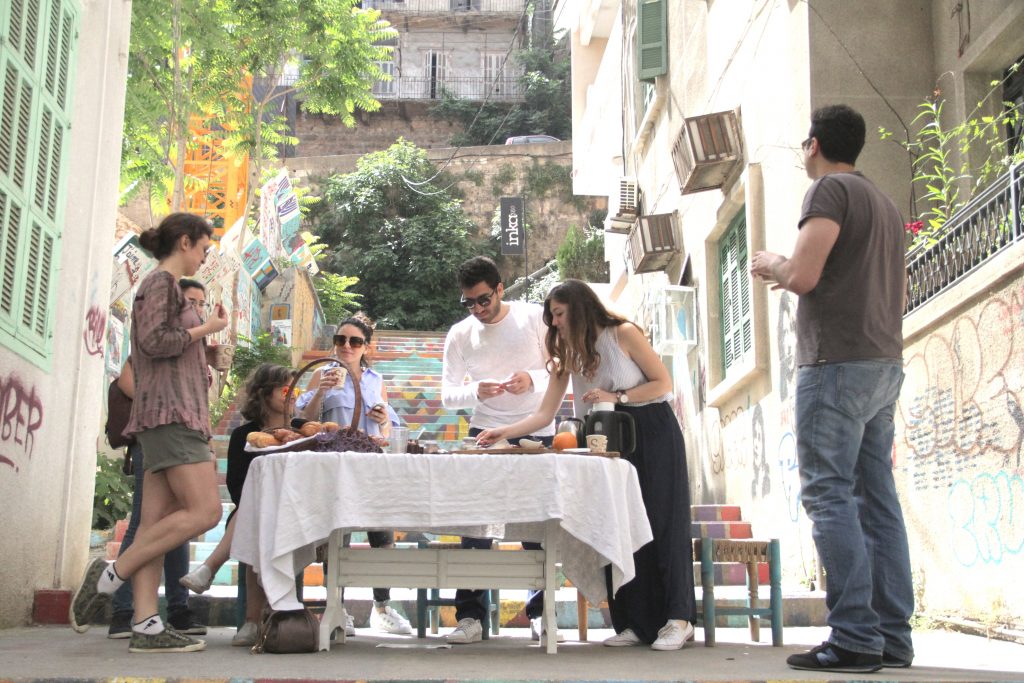
Apply the Burning Man principles
As this is the “Burner Edition” of permanent breakfast, we invite you to know about the principles of the Burning Man community and play with them during your permanent breakfast:
Radical Inclusion: Anyone may be a part of Burning Man. We welcome and respect the stranger. No prerequisites exist for participation in our community.
Gifting: Burning Man is devoted to acts of gift giving. The value of a gift is unconditional. Gifting does not contemplate a return or an exchange for something of equal value.
Decommodification: In order to preserve the spirit of gifting, our community seeks to create social environments that are unmediated by commercial sponsorships, transactions, or advertising. We stand ready to protect our culture from such exploitation. We resist the substitution of consumption for participatory experience.
Radical Self-reliance: Burning Man encourages the individual to discover, exercise and rely on his or her inner resources.
Radical Self-expression: Radical self-expression arises from the unique gifts of the individual. No one other than the individual or a collaborating group can determine its content. It is offered as a gift to others. In this spirit, the giver should respect the rights and liberties of the recipient.
Communal Effort: Our community values creative cooperation and collaboration. We strive to produce, promote and protect social networks, public spaces, works of art, and methods of communication that support such interaction.
Civic Responsibility: We value civil society. Community members who organize events should assume responsibility for public welfare and endeavor to communicate civic responsibilities to participants. They must also assume responsibility for conducting events in accordance with local, state and federal laws.
Leaving No Trace: Our community respects the environment. We are committed to leaving no physical trace of our activities wherever we gather. We clean up after ourselves and endeavor, whenever possible, to leave such places in a better state than when we found them.
Participation: Our community is committed to a radically participatory ethic. We believe that transformative change, whether in the individual or in society, can occur only through the medium of deeply personal participation. We achieve being through doing. Everyone is invited to work. Everyone is invited to play. We make the world real through actions that open the heart.
Immediacy: Immediate experience is, in many ways, the most important touchstone of value in our culture. We seek to overcome barriers that stand between us and a recognition of our inner selves, the reality of those around us, participation in society, and contact with a natural world exceeding human powers. No idea can substitute for this experience.
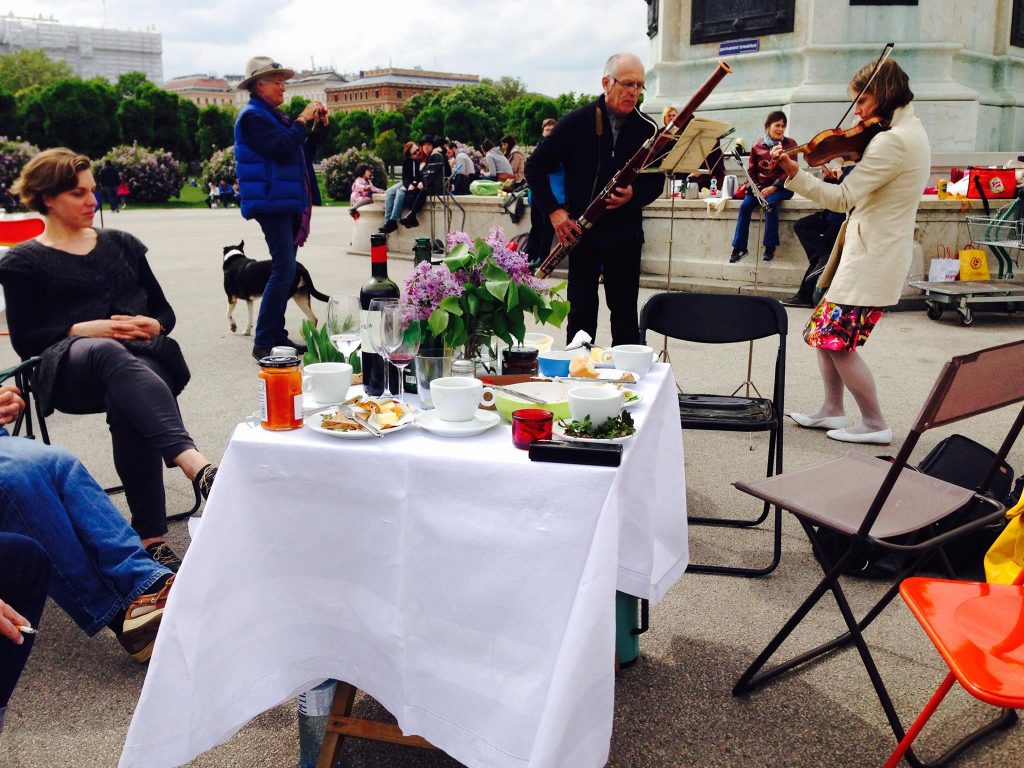
Organize your own breakfast
permanent breakfast is a non-commercial art experience since 1996. It is a proven way to use public spaces and create a surreal “zone”. Copy it!
Do you want to have a nice breakfast with friends on May 1st on a public space? Are you outside of Vienna? Are you a Burner looking to get creative in your hometown? Let us help you with the following nifty checklist:
- Set the date to May 1st 2018 and set a time where many people will be able to come.
- Organize it. Pick a nice location. See the photos for inspiration. Scroll down to “Right of assembly and culture of concession” for a legal perspective. Copy-paste this text, adapt it to your needs, use our photos. Please give credit to all authors.
- Publish your event on your favorite Social Network. Communicate it to your friends. If you are a Burner: Spread it on your Burning Man regional network communication channels.
- Send it to leobard -at- burners.at to have it listed here in this post.
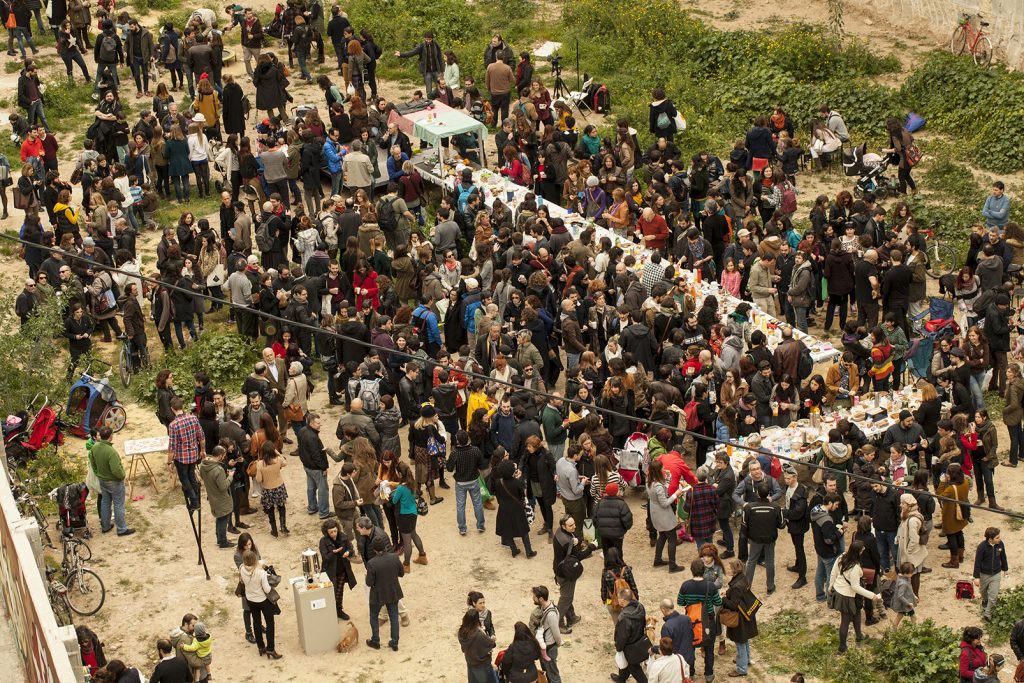
Why permanent breakfast and Burning Man?
by Leobard
Burning Man is, in 2018, known as a 70.000 people temporary utopian city which exists only for a week every year in Black Rock desert in Nevada. It is also a global community of “Burners” who organize comparable regional events worldwide around the year, based on the “Burning Man principles” you find above. But it wasn’t always like this. The Cacophony Society of San Francisco – a group of prank artist – organized urban events in the 1980ies and 90ies. They created “Zones” of surreal experiences: eating on the golden gate bridge, formal dinner parties in the underground sewers, urban kayaking, etc. It took this group about a decade to find the right people and get trained in urban prank art before they first stepped into Black Rock desert and started “Burning Man”.
“permanent breakfast” is a worldwide movement that started in Vienna in 1996. It took historic inspiration from the “Paneuropa-Picknick” where for a 3-hour long breakfast on 19th August 1989 at the Austrian/Hungarian border the “Iron Curtain” separating east and west Europe was briefly opened and thousands fled into the west. In the 21st century, “permanent breakfast” inspired people to utilize public spaces for local communities. It crosses social barriers. It lead to political change in Valencia by the grassroots Desayuno con Viandantes movement, at the end toppling over another government.
So for me as a “Burner”, doing a “permanent breakfast” also means going back to the roots: creating surreal zones in urban areas. As Burners we know how to organize “Burns” in remote areas and “Decoms” in town at dedicated private spaces. It is another challenge to utilize public space but a great and proven way of having a fun experience by creating an urban surreal “zone”.
Note: the “permanent breakfast (burner edition)” event is not officially endorsed by Burning Man LLC, the non-profit organization of Burning Man. It is co-created by Leobard, the Austrian Burners Association, and Friedemann Derschmidt, the founding artist of PermanentBreakfast.org.
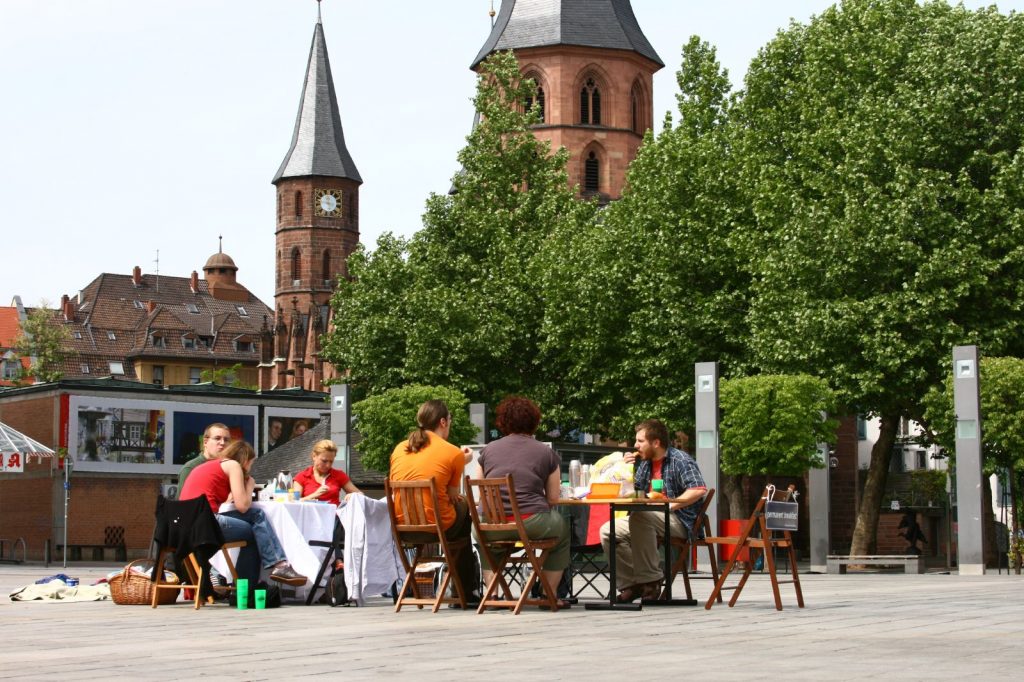
Right of assembly and culture of concession
By Ursula Hofbauer, originally published on permanentbreakfast.org . Included here to shine light on legal aspects.
Passers-by and neo-breakfasters are always easy to baffle if we explain that the breakfast they are looking at is not registered, thus not officially authorised. In fact – with the exception of a nightly “candlelight breakfast” – no breakfast has ever been registered. To do something that is not explicitly allowed, is often viewed as very courageous, even as borderline legal. As a reaction to it, we often hear: “Something like this would not be possible where we are from (in Grammatneusiedl, in Luxembourg, in Germany, etc.)!”
If we involuntarily take in the quaint role of being the vivid proof of the particularly liberal Austrian legislation, respectively for the liberality of the Austrian or especially the Viennese executive authority, we get the chance to softly disagree and to invite to test the impossibility of having breakfast within the own surroundings. Because in fact the legislation is not as rigid as often imagined.
The Verfassungsgerichtshof only values the gathering of several persons as an assembly in the sense of VersG (Versammlungsgesetz 1867; 1953), if it is organised with the intention to encourage the participants to act together (debate, discussion, mainfestation etc.) and so cause an association among the gathered results (VfGH, Slg. 4586/63, 5193/66, 5195/66, 8685/79, 9783/83, 10443/85, 10 608/85, 10 955, 11 651/88, 11 866/88, 11 904/88, 11935/88, 12 161/89). An assembly is – in other words – a congregation for the instant, a scheduled gathering of a number of people within a non-institutional community (see also Winkler, p 199,212,229,272); or, the gathering of people (also on streets) with the objective to debate opinions or demonstrate opinions to others to initiate a collective action (see also Deutsches BVerfG 11.6.1991 ! EvR772/90, EUGRZ 1991, p 363); or the collective expression of opinions with the aim of intellectual debate.
The common wish to be together and stay together is essential for an assembly in the narrower sense, even if participants dispute with each other. It is not essential if the assembly was planed or occurred spontaneously.
So much to the constitutional law in the case of the collective utilisation of public space, which is often picked out as a central theme in breakfasts (as for example the authorisation of the breakfasts is always questioned by passers-by) and which can simply and implicitly be explained through the practise of having breakfast by showing that this form of utilisation is – simply – possible.
Aside from legal issues, having breakfast is an excellent tool to extend the own imagination and the models to utilisation of public space in practice. The common culture of concession, thus the assumption that only something that is explicitly allowed is not forbidden, draws the borders of possibilities considerably tighter than necessary and avoids real or imaginary conflicts before they even occur. This safety distance to not explicitly allowed and not formulated behaviors, to not or not yet established models is deeply anchored in culture. We also still have a little stage fright if we have breakfasts in very prominent locations. We still expect that this time a policeman will show up with who we will have to debate or who tries to drive us away, even if we should know better after years of reverse experiences. In this sense, establishing a new behavior-model within the public, thus the model of public breakfast, cannot be the cause of permanent breakfast in practice. Passers-by should not be taught the right, thus courageous behavior of citizens. Rather a variety of possibilities should be pointed out and should inspire to design and actualise new and adequate utilisation of the public space.
Thus, naturally, demands on the space, the quality of the space, arise. From our view, this demand does not entail, as one could imagine, to install equipment permanently for our utilisation on streets, squares or in parks, namely table and chairs for having breakfast. What rather arises from the practise of having breakfast, from the search of appropriate locations, is the demand for flexible space, which does not provide a fixed utilisation, but make many uses possible. That is, and we do not want to leave this in doubt, a political demand, because what could be more political than the request to have the power to have resources at our command, especially public resources and public spaces.
Public and pseudo-public
In practice the breakfaster seldom hits the limit of what the executive authority tolerates, respectively has to tolerate. Considerably more often we meet private security services, if we set up tables, chairs and coffee pots in a location. We were banished by the responsible security of the Museumsquartier from the court yard – with the information that the property is operated by a private company. Also ÖBB removes not suitable persons and activities from the station premises. A right to assemble here, as applicable in public spaces, does not exist for private spaces of course. On the one hand it is exciting that these private spaces mimicry public spaces if it serves the commercial interests of the operator. In the Shopping Center Nord for example, metal street signs refer to streets and squares of the first district, sales booths look like market stands and are next to lawn chairs and parasols under which a popular car manufacturer sells his newest models. The pictures of publicity that are evoked are obviously attractive and are willingly used to attract customers. These pictures can indeed camouflage that essential moments of publicity are missing here, first and foremost the right to stay in these spaces. Strictly speaking, private operators or owners do not even need a justification to banish not suitable visitors from the location. In this pseudo-public space no demonstration can take place, no homeless can hang out and of course there is no right that assemblies for the instant can be established as talked about in the above. As long as one only wants to shop (with ATM card and if possible no deterring skin color) no problem arises from these limitations. But seemingly even the paying customer of large shopping centers does not want to be reduced to the role of a mere customer so that one has to offer at least urban ambiance and at least some icons of the public space.
Another form of pseudo-publicity is younger than SCS and SCN and breaks with a certain perfidiousness in through the back door: the privatisation of former public institutions. Granted, in the national library setting up a breakfast table in former times would also not have been possible. But since conversion into a private company an entrance fee has to be paid, which does not leave a doubt that aimless stay is not intended anymore. If not only single museums, single institutions and houses are privatised, but also, like in the Museumsquartier, the entire premises with root and branch, the situation becomes even more odd. One is used to regard these spaces as public and without a cause we will not notice that they are not public (anymore).
These two phenomenons – the camouflage of private, commercial rooms as public and the conversion of public spaces into privately operated – make it more and more difficult to detect in what kind of space we are. Permanent breakfast is a very useful litmus test, to ascertain the character of publicity. Because to have breakfast also always means to insist on the right to assemble, to publicly express oneself and use public resources.
Where we are allowed to have breakfast, there is publicity and vice versa: a space, at least a free space in which we cannot have breakfast is not a public space. Location and time of an assembly cause an immediate socio-political tension between national legislation regarding utilisation of public space and the acting persons (see also occupation of the Burggarten in the early 80s). A breakfast in a public space can therefore always be regarded as a political act.
Horror vacuti
Luckily there is still plenty of public space in which we can have breakfast despite federal economy measures and neo-conservatively motivated reorganisation of public institutions. Streets, squares, parks, street refuges, short-term parking zones, the Strudelhofstiege and the busstops of the Wiener Linien.
Of course beautiful locations, felicitous squares should be used, especially the former manorial spaces. The city is yours. Every year on May 1 we have breakfast at the Heldenplatz. An every-day-activity like having breakfast on the grounds of the Hofburg plays with the picture of the sovereign, who formerly was the Emperor and used the wide area of the Burg to satisfy his private needs. To be sovereign could also mean to acquire the sensual pleasure of these spaces every day. Schoenbrunn for everyone, not only for touristic contemplation, to take pictures, but also to live in it.
If we leave the Burggärten in direction of the old and new suburbs it becomes tight. Not only because of space limitations. A phenomenon, which is encountered often, we called “horror vacuti”, the fear of the empty space. Because we could almost formulate as a rule, that everywhere where there is little space, something certainly is in the way. A flower trough, a tulip bed, a bench, a fountain, a piece of art. As a general rule, always in the center of the square. Possibly these things are placed there to provide sensual pleasure to the sovereign, so he does not always have to move to the Hofburg or Schönbrunn when he feels like he needs something beautiful. But possibly these things are placed there, to not even awaken the suspicion that this space could be used in some way. The sovereign, who would go to his former hunting ground on every reasonably beautiful spring day to smell the grass in bright flocks, to skate, to play ball, to make music and picnic could namely get the idea to also do all these in this space. But possibly many people who spend their lives with planning and landscaping such squares, suffer from a form of agoraphobia, which forbids them to leave the object of their design empty. Nothing is more adequate to disperse this fear than a well placed, set breakfast table.
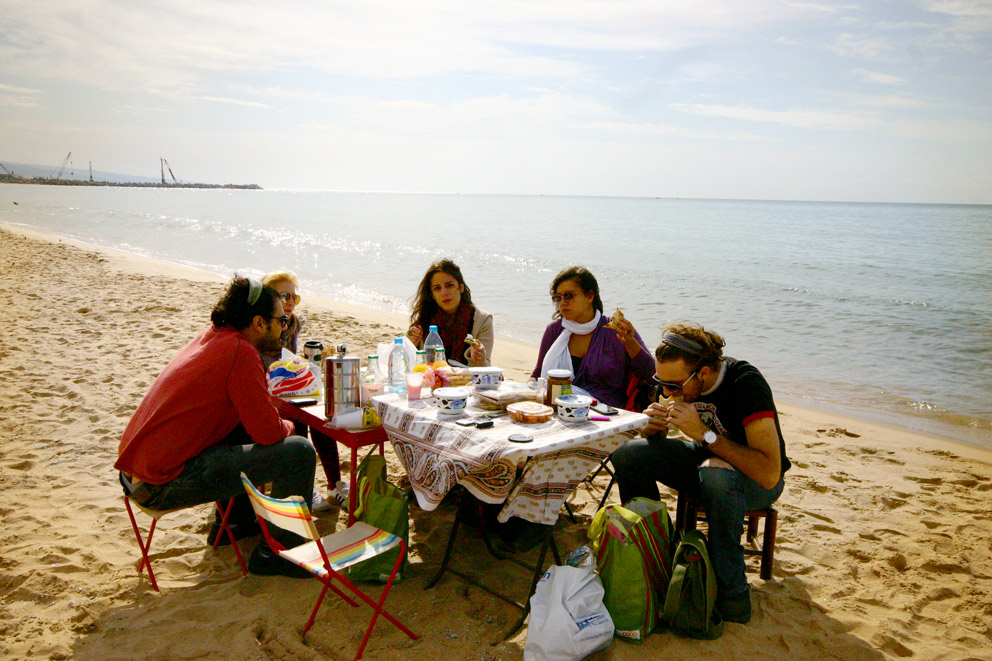
There is no free lunch… … but permanent breakfast…
by Karin Schneider, originally published on permanentbreakfast.org included here to illustrate the experience of a permanent breakfast
[First Scene] “I don’t have time.” said the old man leading a child by the hand across the main plaza in the town of Güssing. His pace increased after he was invited for coffee. Others are so agitated that they can’t verbally say no, they merely flick their wrists to where some show their wristwatches, to indicate they have no time.
[Second Scene] The main square in the town of Laa/Thaya. There is a breakfast table in the middle of a crowded parking lot. It becomes clear that people have come here to shop. They use the main square, which is also a parking lot, to hurriedly pack their purchases into their cars. Funny, people don’t seem to really take notice of the surreally–placed table. When people take a break it is in the overcrowded café´ on the edge of the square. A single local man approaches us. He says that his reputation in the town “is already ruined.” If it was not, it would be extremely embarrassing for him to be seen eating breakfast here in the middle of the day. And that, we learn, is why no one else wants to sit down with us.
What is going on?
It is clear that the old man and his grandchild who were walking across the main square in Güssing in reality did have time. But for whatever reason it is important that the suspicion not arise that they have too much time.
The glance and pointed finger at the wrist is a widespread gesture. We are given notice then that there someone is in a hurry, that time is running. No actual wristwatch needs to be there. The clock face has been internalised as if it were engraved into the human wrist. Gilles Deleuze calls it the “electronic collar” as a metaphor for the replacement in society of discipline by control.
That it is “too embarassing” to sit down is probaly due to the fact that we are having breakfast. Meals in themselves are social events which can also be enjoyed by guests outdoors. But to invite unknown passersby as guests and to confront them with a gesture of trust is an exciting part of the performance which is often reciprocated in a friendly way.
However, breakfast is that meal which takes place after the involuntary act of waking up, but which, despite the advice of experts, is usually eaten quickly or not at all.
A leisurely breakfast is usually had on Sundays, which marks it as a special day. Therefore, whoever eats breakfast in the middle of the day is somehow seen as stealing part of the day, someone who does not have the job which breakfast is supposed to nourish them for. The public breakfast culture has changed in recent years to the point where it has become a business, the rehabilitation of breakfast.
It has also recently provided the message that those who can leisurely enjoy their breakfast must belong to the most successful segments of society, who are not bound by office hours, who are on the road with cell phone and laptop, and who can do their jobs anywhere and everywhere. Hip breakfast bars as places for press conferences (press breakfasts!) and business meetings show that the new economy is willing to play with forms of leisure and to use them to their own ends (as in “Taxi Orange”, where the countercultural concept of the perfect communal apartment became instead a metaphor for neoliberal policies of selection, constantly being watched, and which mutated into an entertaining version of a society being controlled. Lunch is often the ideologically freighted meeting with other family members, including the saying of a prayer before the meal. But where this is not possible, namely in the office, the family is then simulated by wishing everyone “Mahlzeit!” at 12 noon. In comparison, dinner is used for talking about business or for a rendezvous and blind-dates. Breakfast is (or was) a private affair. In a robe, sleepy, silent, listening to the radio. Everyone at their own pace.
permanent breakfast also means bringing this private ritual into the public and to share a part of the interior life with strangers. It is seen as a provocation by many that we use the time before the sun goes down to breakfast, and that we see this as a meaningful use of time, and, even more so, that we do it in public. To participate in a small Austrian town is not without danger. It is a small leap from being a good citizen to being a bum. The distribution of free food is also seen as a provocation, although in scene two, relaxing in a cafe´ was completely acceptable. In the actual classic permanent breakfast, the consumption of food has a subordinate role, however, that there are discrete treats on offer when coffee is being served (as a silent gesture to provide something edible) is a necessary part of the ground rules: Everyone invites a person to breakfast, while payment comes in the form of “grasping at straws” (Paul Watzlawick calls it a “chain reaction of the good ”, the end of “zero sum games”). Everyone is familiar with public gifts, especially those involving food, and we´re all well-trained in the proper cultural codes: there is no free lunch. For many people this is a fact which for them also applies to free samples in advertising campaigns. These people have enough reasons to avoid our table. Being a member of the economy, therefore, means to be thoroughly mistrustful of all other possible lifestyles, especially those which do not or will not follow economic norms. For such people these are danger zones to be avoided because they might place a question mark over their day-to-day lives.
We should seriously consider if there is not really such an imperative: there is no free lunch. And there should never be any because people think “I want to earn my own.”
In recent decades there has been the recurring discussion about the crisis within the working class if the identity-creating effects of working and earning should be completely rethought to consider forced periods of unemployment as containing the positive potential of a “time out”, if the economy was organized in a different way (that is, a guaranteed income for everyone). Then these involuntary loafers would not have to hide themselves by aping normality in refusing our offer of breakfast.
Clearly, in light of climbing unemployment and an alleged economic crisis and the surrender of any real attempt to realistically reconfigure the economy while thinking of economic growth results in nothing but handwringing. Yes, and we also go along with it because we know there is nothing “beyond the economy”, that all “timeout islands” from the workforce were always part of the organization of the economy, etc., etc. Dialectically, for us professional loafers the breakfast is hard work and a difficult way to make a living.
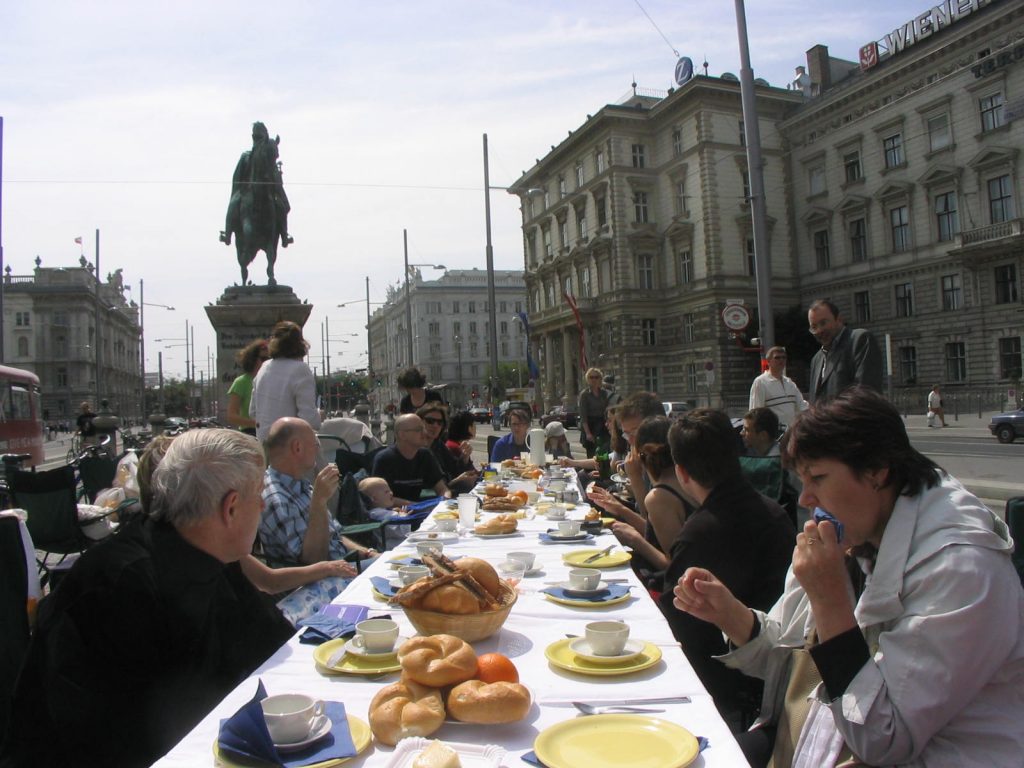
See how others have done a permanent breakfast
Photos collected by Friedemann Derschmidt
